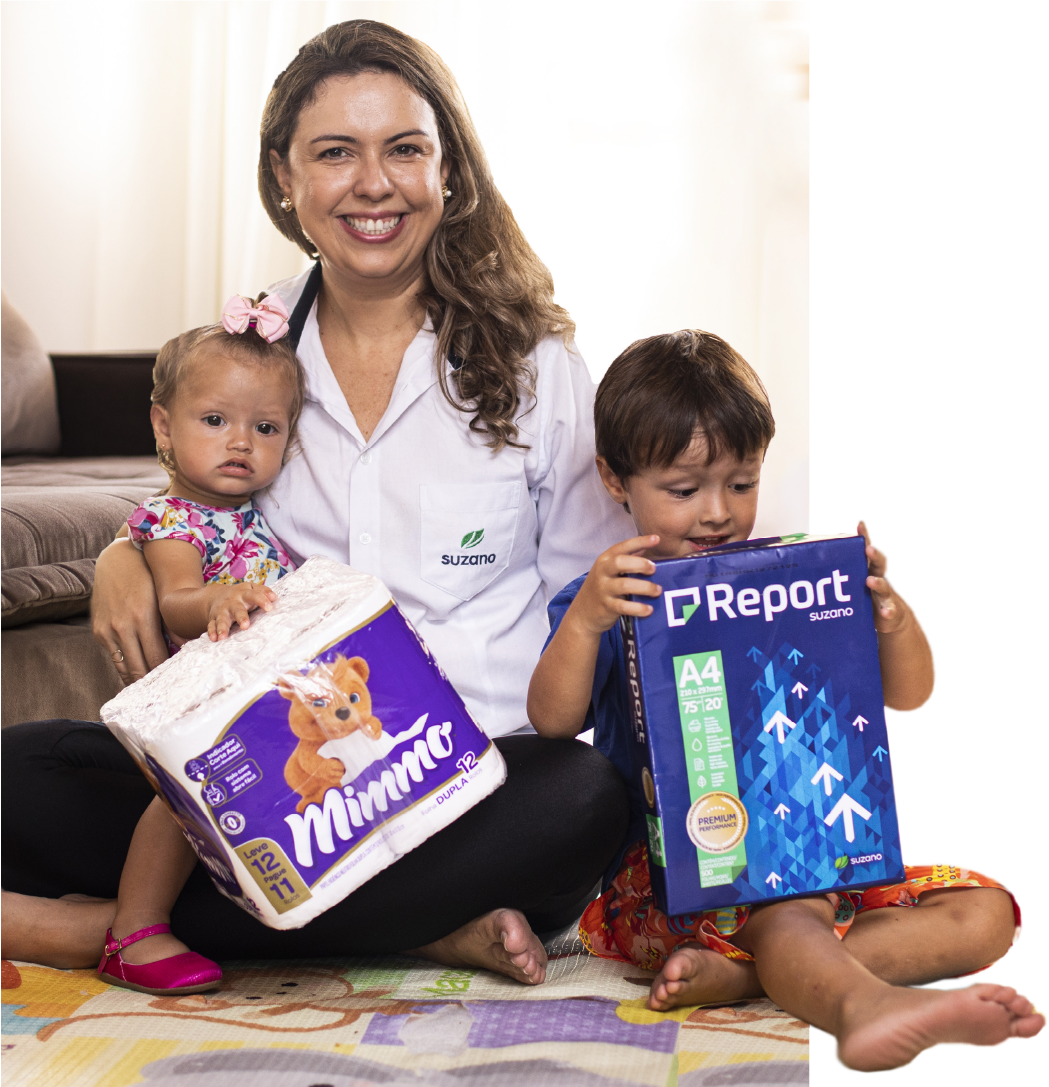
Customer
Suzano impacts the lives of more than 2 billion people worldwide. A significant part of its products reach consumers through customers spread over the various continents. Our approach tailored to their needs and to the development of biosolutions has led to important advances for the company in customer relations and in the development of new partnerships and products.
Associated material topics:

PULP
DYNAMISM AND FLEXIBILITY
GRI 103-1, 103-2, 103-3 (Value Chain [customers and suppliers])
Suzano started 2020 with excellent prospects from a market standpoint after a very challenging period marked by rising inventories and falling prices. However, the pandemic brought new uncertainties to the pulp and paper sector, in varying proportions for each market segment and region.
The increase in tissue consumption in countries in the Northern Hemisphere and Asia, where we do a significant volume of business, driven by consumers stocking the product and emptying the shelves in retail chains, especially during the first half of the year, generated a demand beyond that expected for market pulp.
On the other hand, given the expansion of social distancing and the economic downturn, the negative impact on printing and writing paper and specialty segments gradually increased, mainly in Europe. Due to this difficult scenario, some integrated pulp producers in the Northern Hemisphere stopped producing paper to produce more pulp. Soluble cellulose producers did the same, affected by the drop in production in the textile industry. The imbalance between market fundamentals, therefore, put additional pressure on prices. Despite all adversities, our focus has remained the same: serve all our customers, seeking to continue supplying our pulp.
Signs of recovery
After a tough period, experienced mainly in the third quarter, the company observed the rebound of all pulp markets. In China, it is worth remembering, the scenario was a little different, as the country quickly recovered and has been growing, generating the opportunity to increase prices.
Since the beginning of the pandemic, Suzano has intensified the dialogue with its customers and between its internal teams. This is because we understand the relevance of being prepared to implement, at any time and as soon as possible, the contingency plans to avoid disruption in production and logistics. Consequently, we managed to deal with the fluctuations in the period and successfully meet all production demands.
Eucafluff®
Major partnerships consolidated the entry of Eucafluff® into major global customers, strengthening its position in Europe, Asia, and the United States in 2019. The result of more than a decade of research by Suzano, this is the world’s first bleached eucalyptus kraft fluff pulp, which can be applied in absorbent and personal hygiene products, in addition to disposable items, such as adult and baby diapers and sanitary pads. The year 2020 was about consolidating what had been started in 2019. However, the prospects for expanding the business were affected by the developments of the pandemic, since the product qualification process is long, interactive, and in-person. As a result, Suzano’s plans to open new accounts during this period were compromised.
EU Ecolabel Seal
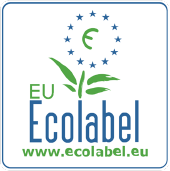 Suzano’s Eucafluff® became part of the list of raw materials authorized for use in disposable hygiene products certified with the EU Ecolabel seal. Recognition is granted by the European Union to final producers who meet high environmental standards throughout their cycle, from the extraction of raw materials, through production and distribution, to disposal. The seal certifies to consumers that they are using a product that is sustainable from start to finish.
Suzano’s Eucafluff® became part of the list of raw materials authorized for use in disposable hygiene products certified with the EU Ecolabel seal. Recognition is granted by the European Union to final producers who meet high environmental standards throughout their cycle, from the extraction of raw materials, through production and distribution, to disposal. The seal certifies to consumers that they are using a product that is sustainable from start to finish.
To be part of this select list, Suzano demonstrated its excellence based on strict environmental criteria, which analyze energy consumption, greenhouse gas emissions (GHGs) during production, and release of pollutants into the air and water, among other aspects. Such differentiators were also pointed out in the Life Cycle Assessment study conducted by ACV Brasil, in which Eucafluff® showed favorable environmental performance results in categories such as the use of land, water, and GHG emissions when compared to the environmental performance of the pine fluff produced in the Southeastern United States.
PAPER AND PACKAGING
FLEXIBILITY TO FACE THE CRISIS
GRI 103-1, 103-2, 103-3 [Value Chain [customers and suppliers)]
Paper was the business unit most affected by COVID-19. Social distancing led to the closure of offices, schools, and universities, and most commercial activities. In this context, these segments of society have significantly reduced the consumption of one of our main products: printing and writing paper. This market was already suffering in developed countries, due to the disruption caused by digital alternatives. However, in developing markets, mainly in Asia (especially China), there was still an increase in demand for this product.
By 2020, during the most critical period of the pandemic, consulting firms covering the industry estimated a decline of 15% – 25% in the printing and writing market. However, by the end of 2020, the Pulp and Paper Products Council (PPPC), for example, reported a 29% decline in this segment in Latin America. In other words, from March to December, the decline in this market represented a 1/4 reduction in total demand for 2019.
To face this scenario, the company put an action plan in place, made possible thanks to the combination of some factors that give us agility in decision making: we have about 300 salespeople in Brazil and a differentiated distribution model that keeps us close to our 35,000 customers in the country. With this reach, we managed to act quickly to serve other markets and support our partners. Below are two of our main initiatives.
- Tamo Junto (We’re in it together): A financial support program for printing companies, stationery stores, and publishers in the country, offering credit and debt renegotiation, in addition to the donation of communication materials and prevention kits for daily use at points of sale. The project benefited more than 1,000 partners through four fronts. The first, focused on supporting the business, offered differentiated credit, debt renegotiation, and flexibility of charges. The second donated essential materials to reduce the spread of the coronavirus, such as face shields, adhesive signs with distancing information for points of sale and hand sanitizer dispensers. The third included a communication package with information on hygiene and cleanliness, social distancing, cash flow, flexibilization and credit by the National Economic and Social Development Bank (BNDES). The fourth front is an online channel where our partners can access specific content.
- Papers for specific segments Some sectors became more demanding during social distancing and the pandemic. In this sense, we directed our efforts to paper and packaging in the food, pharmaceutical, and hospital segments. In addition, we developed alternatives to paper for drug instruction inserts, special paper bags (replacing plastic bags), and other packaging.

E-commerce sales
In the second half of 2020, more than 50% of the sales on the Suzano + Platform to micro and small customers were made via e-commerce.
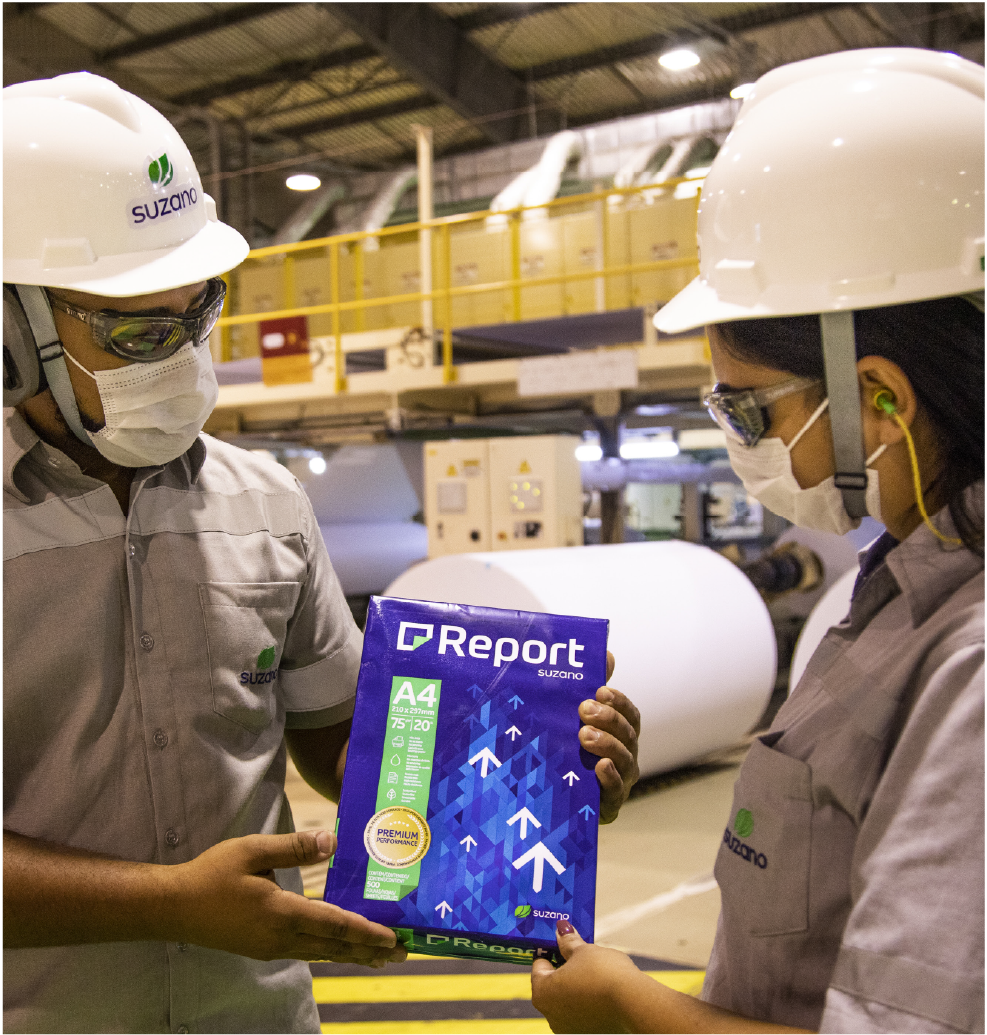
About the Loop®
Paper produced from renewable raw material (trees planted specifically for that purpose) offers a better paper straw experience due to its high performance and resistance to liquids, ensuring that the product remains intact for up to two hours of use, with an excellent feel for the user. Its production process results in fewer losses and has greater versatility to create more compelling products, in addition to being lightweight and sustainable.
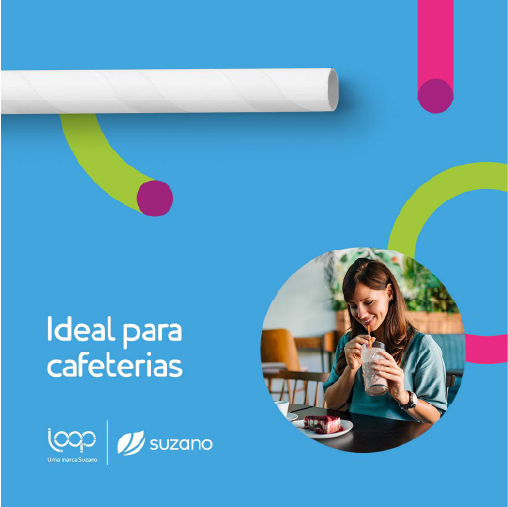
Loop Paper® and Do Bemzinho
One of Suzano’s Long-Term Goals is related to the replacement of plastics (learn more here). In 2019, we launched Loop Paper®, a specially designed paper for the production of drinking straws as an alternative to plastic straws. In 2020, Suzano and beverage maker Do Bem™ joined forces to replace plastic straws in the ‘Do Bemzinho’ products, a line of juices for children, which will now use straws made with our paper. In Brazil, Loop® is present in almost every fast-food chain.
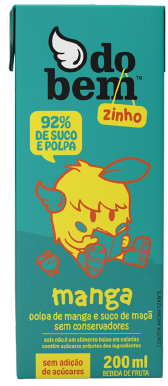
With a new look
After eight years, the Report® paper portfolio, with its complete line of printing and writing paper, gained new positioning and packaging. Based on an understanding of consumer desires, the new visual identity showcases the main qualities of the product: performance and sustainability. The new packaging, with a more modern and clean design, highlights the differences and usability of each product in the line, reinforcing the attributes: sustainable, more resistant, does not smear, and does not jam the printer.
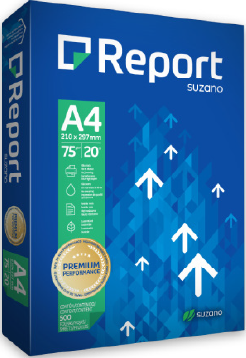
Paper donations
In 2020, a large mobilization was seen in the paper industry to meet the demands arising from the new coronavirus. In this respect, in partnership with other producers, Suzano coordinated the donation of 5 million paper cups produced with our Bluecup®, the first Brazilian card stock developed for cups and made from a renewable source. The donation was made to public hospitals and municipal administrations in the states of São Paulo, Santa Catarina, and Paraná.
In addition, Suzano contributed to the production of face shields made using card stock, conceived by Brasilgrafica S.A. The product was donated to the Ministry of Health. We also donated 8 tons of card stock to make 350,000 hand sanitizer containers, geared for Natura’s consultants and truck drivers.
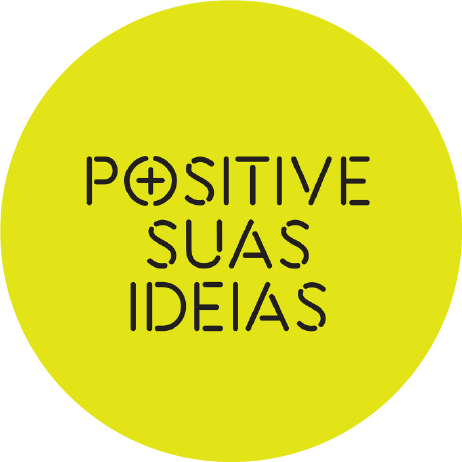
In 2020, Suzano invested in the restructuring of its platform called Positive Suas Ideias (Materialize Your Ideas), a movement created to rethink production and consumption through creative and sustainable packaging. It is worth mentioning the Innovation Day, held together with PepsiCo and L’Oréal, to share our capabilities in terms of packaging and looking to find possible synergies.
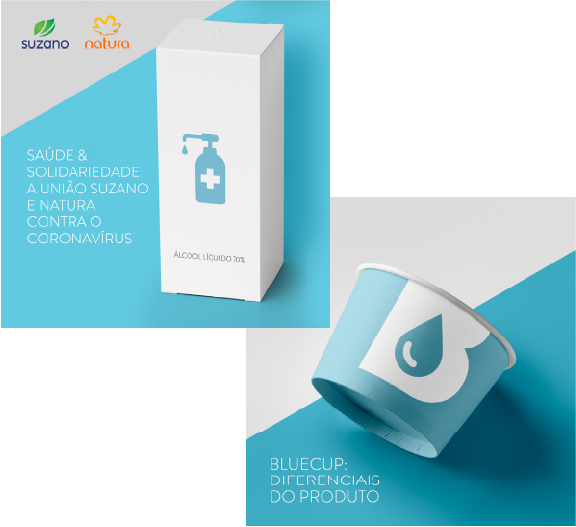
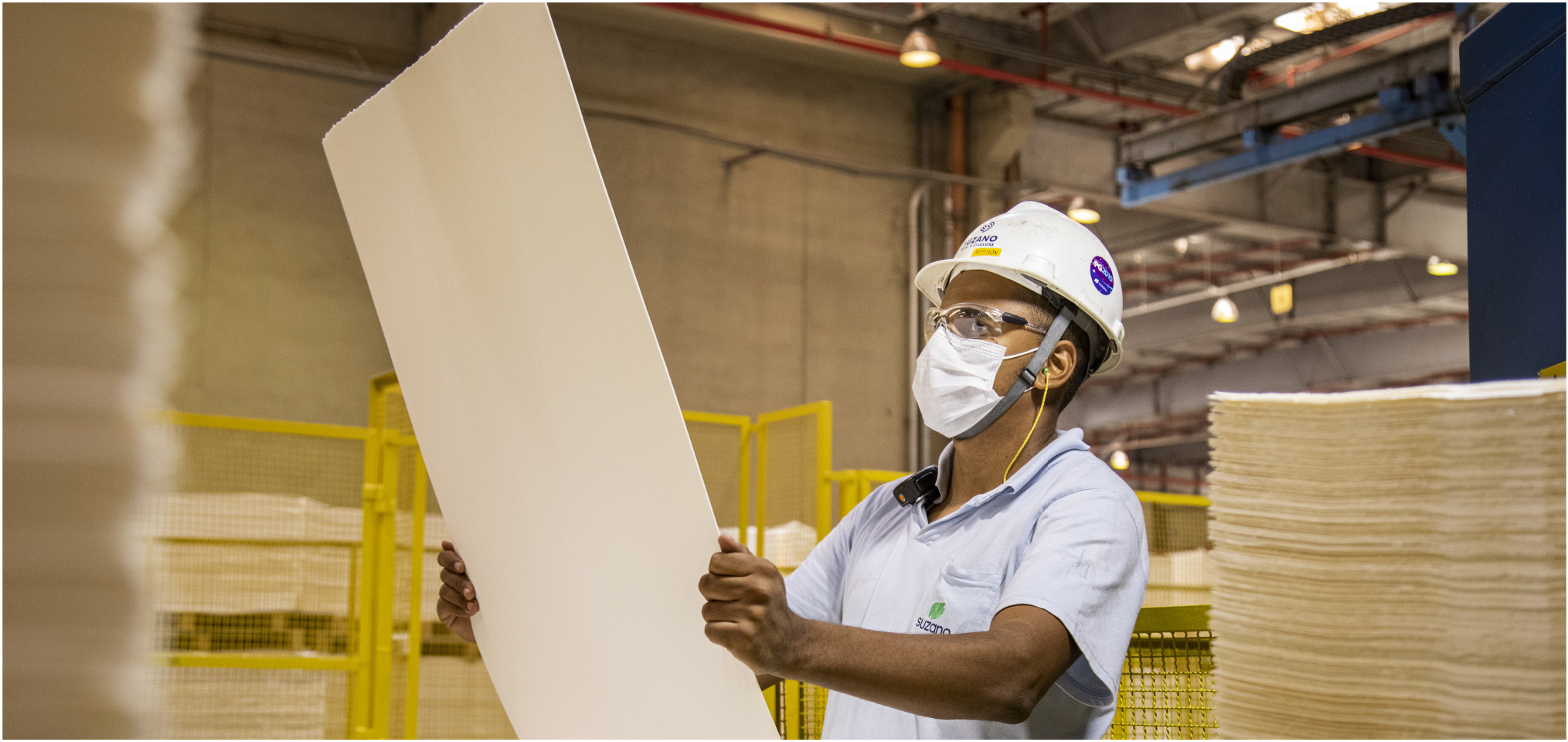
Circular economy
GRI 103-1, 103-2, 103-3 [Value Chain [customers and suppliers], Innovation and Technology]
A major concern for Suzano has always been to develop products with the least possible environmental impact and provide solutions to the market based on a systemic vision, driven by facts and data. That is why, in the world of paper, we use tools such as Life Cycle Analysis in our evaluations and product development. Internationally recognized, this approach offers a careful assessment of the potential impact of products. It considers the entire production process, from the extraction of raw materials to the disposal of products, allowing for an extensive assessment of cause and consequence. With this information, we can support our innovation processes on the best alternative.
Thus, we have sought in-depth knowledge in order to understand how we can be relevant players in this transition movement, which values, among other things, a more circular economy (which proposes a shift from the linear model of obtaining resources, producing, and disposing of products), while generating the least possible impact. As a company based on renewable resources, when we think about closing the cycle, we know that we have many opportunities to explore a biological route (which itself is regenerative and zero waste when the components of the product can return to natural biological cycles), focused mainly on biodegradation processes.
Within a possible technical route that also leads us to circularity, we have sought to increase our active participation in the recycling chain, knowing that this is one of many important attributes that need to be addressed. Since our priority is to ensure that each solution is, in fact, better from a social, environmental, and systemic standpoint, we use Life Cycle Analysis to validate all possible alternatives. We understand that there is no point in addressing the issue of solid waste, for example, while adopting processes that demand more natural resources or result in greater emission of greenhouse gases (GHGs). We live in a time when it is no longer enough to think of one or the other, but rather one and the other.
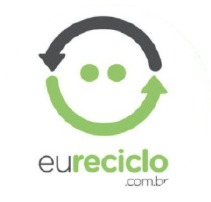 Throughout this year, we have worked on the development of TP Cycle, a new card stock that uses post-consumer fibers in its composition, mainly coming from packaging. For the development of this project, we entered into a partnership with Eureciclo, a B corporation specializing in reverse logistics, which mapped the supply of paper trimmings to guarantee the best technical performance of the product. They also approved the labor conditions behind each supplier, thus helping us to secure a solution that promotes a more positive chain.
Throughout this year, we have worked on the development of TP Cycle, a new card stock that uses post-consumer fibers in its composition, mainly coming from packaging. For the development of this project, we entered into a partnership with Eureciclo, a B corporation specializing in reverse logistics, which mapped the supply of paper trimmings to guarantee the best technical performance of the product. They also approved the labor conditions behind each supplier, thus helping us to secure a solution that promotes a more positive chain.
In a form of complementing TP Cycle, we reinserted post-consumer card stock fibers into the production of our suppliers of cardboard boxes, which are now used to pack our reams of cut size. This alternative has two main advantages: the first is its scalability since, in this case, the production potential of the cardboard chain after absorbing post-consumer material is substantially greater than that of card stock. The second is the mitigation of environmental impacts: since cardboard can now be produced using this type of input without major changes to the process, the reinsertion impacts caused by technical losses in the final product are minimal when compared to the production of card stock of a comparable category.
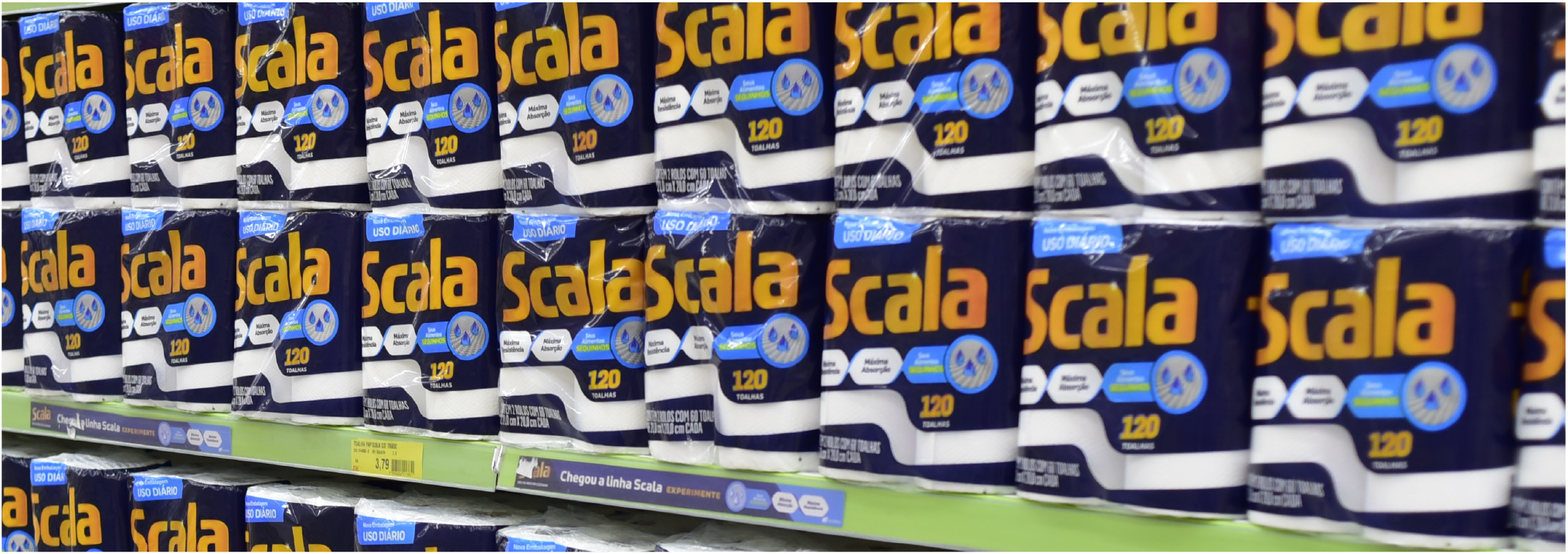
CONSUMER GOODS
POSITIVE BALANCE
GRI 103-1, 103-2, 103-3 (Value Chain [customers and suppliers))
Suzano’s biggest challenge in 2020 was to keep the operation running smoothly, ensuring the safest conditions for its employees and their families. This level of safety was maintained in consumer goods, which brings together around 1,200 professionals across the country. Trips and visits were postponed, and processes were adapted to the new reality. Fortunately, all projects were maintained.
Production and sales records
Suzano operates in the consumer goods market with a focus on the tissue segment, composed mainly of products such as and papers for sanitary purposes (toilet paper), paper towels, and napkins. Across Brazil, demand for this paper line has skyrocketed since March 2020, requiring high execution capacity for the company to quickly redirect mills and its business model in order to respond well to the new needs of customers. As a result, Suzano reached an 8.3% share in value in the toilet paper market in the last year, making it the fifth largest company in this category in Brazil.
We consolidated our leadership in Brazil’s North and Northeast regions, expanding the gap with the runner-up, and reinforced our presence in the Southeast and Midwest, where we had a smaller share in 2019. In 2020, we increased our relevance, especially in the states of Espírito Santo, Rio de Janeiro, and Minas Gerais. In the state of Espírito Santo, we are a leader in tissue. The data obtained by Nielsen show in 2020 that the Mimmo® brand is a leader in two-ply tissue, with 28% market share. In 2021, we are looking to expand participation to other states in the Southeast and Midwest.
Belém and Fortaleza Units
Completion of the integration of units and processes between Suzano Papel e Celulose and Fibria, which was one of the main priorities for 2020. All incorporation processes were applied at the former Fábrica de Papel da Amazônia SA – Facepa, the largest producer in the tissue segment in the North and Northeast regions. Its installed capacity is nearly 50,000 tons per year.
In addition to absorbing the new company from a tax and IT standpoint, we worked on cultural awareness in our two mills, which became Suzano units: Belém (Pará state) and Fortaleza (Ceará state) units. It is also important to highlight the actions related to work safety, which significantly reduced the number of accidents in both locations
New mill in Cachoeiro de Itapemirim
When the pandemic arrived in Brazil, Suzano was starting to build its new tissue mill, located in Cachoeiro de Itapemirim (Espírito Santo state). We interrupted work on construction for a few weeks to understand the new scenario, analyzed the healthcare conditions in the municipality, revised our schedules, and adopted a series of measures until the work could be carried out safely. As a result, on March 2021, we started-up a new plant, which will increase our production capacity by 30%.
The three-ply toilet paper will be the unit’s product highlight, following a trend of a higher quality product. The toilet paper segment is in the process of migrating to higher quality products, from one-ply to two- and three-ply tissues. According to data from Nielsen from 2018 to 2020, the share of two ply and three ply tissue in the Brazilian market grew by 6 percentage points. As the category matures, it is natural that consumers will migrate to more sophisticated items.
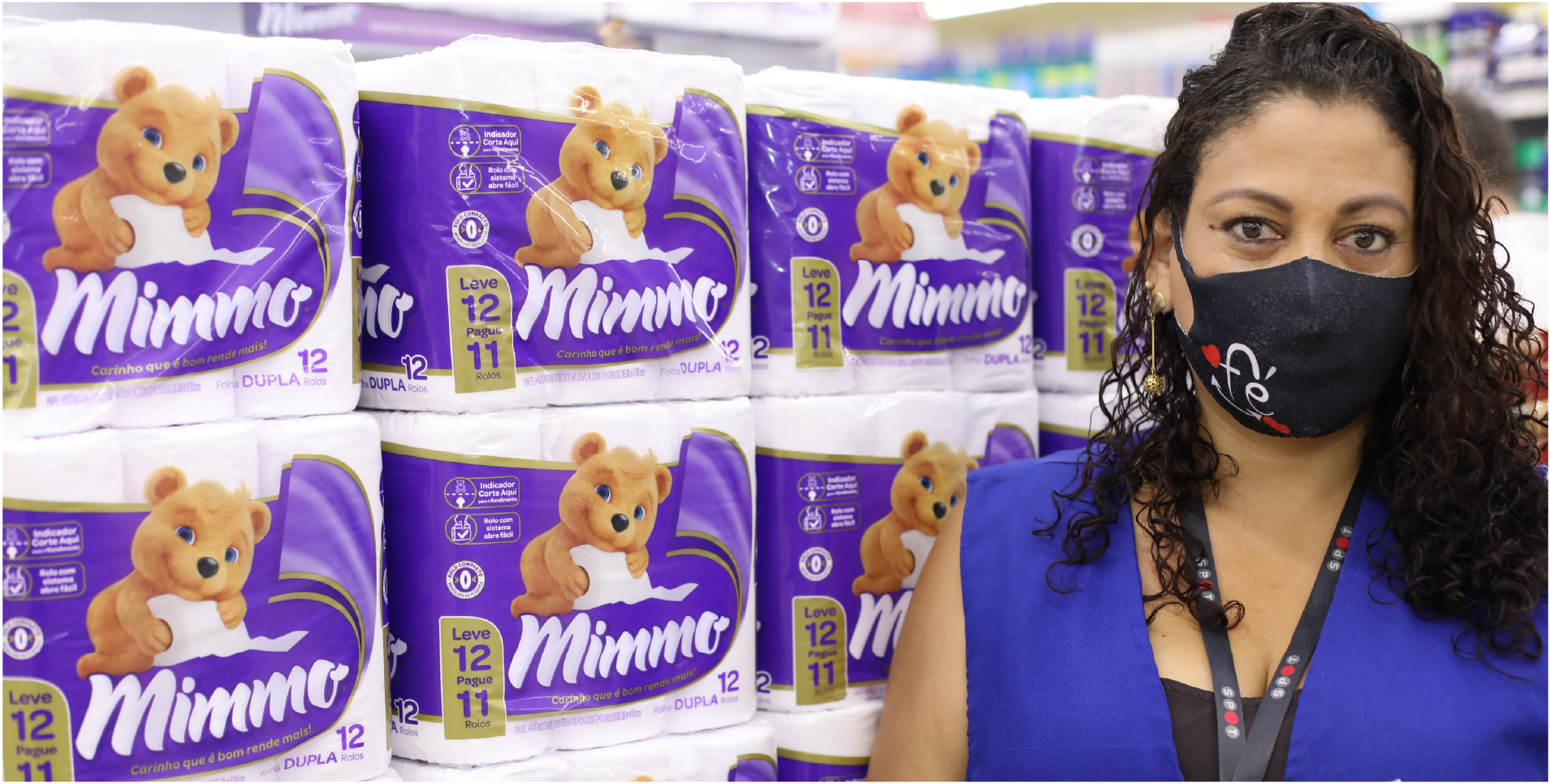
Research & Development
LEADING EDGE KNOWLEDGE
Suzano increasingly works on initiatives with enormous disruptive potential. These are projects that focus on what we call innovability; in other words, innovation at the service of sustainability.
In a year of pandemic, our challenge increased. How could we proceed with dozens of innovative programs that depend on travel and international partnerships? How do we find alternatives for a job that, as a result of the health crisis, needed to be done at a distance? Sending samples, monitoring tests, and on-site evaluation of results—all procedures that involve a technical validation of performance and costs, which would normally take place in the facilities of our customer and prospects—have been altered, becoming much more time consuming. Even so, Suzano managed to advance with all projects, obtaining better than expected results.
Suzano’s innovability and research portfolio of innovation and research is based on three pillars: Sustainment, Transformation, and Diversification. See below for the company’s main projects on each front and the respective results achieved in 2020. .
SUSTAINMENT
This explores solutions to the challenges of the current business, centered on planted eucalyptus forests and on the production and trading of pulp. Below, we highlight three examples of projects geared to this purpose.
-
- More precision in forests, transport, and industry
Regrowth management (regrowth of the eucalyptus tree after it has been cut from one or more sprouts left at the bottom of the trunk close to the ground) is the main alternative for reducing forest formation costs; however, in order to generate productive forests, several different technologies are needed across the entire process. In 2020, we consolidated the model for selecting areas of greatest potential, based on technical premises; we designed the forest quality control in two phases; and we innovated with the anticipation of regrowth clearing, which already occurs in all forest units with higher quality and production potential.
This type of management is very much in line with the idea of producing more with less natural resources, since a series of field operations now take place every 14 years, and no longer every 7 years.
Currently, nearly 14% of our forest base is managed through regrowth management. There are economic benefits associated with the system, which can cost up to 55% less than a complete new cycle.
In addition, we use digital parameters to optimize clonal allocation and developed a new system, Tetrys, which allows us to make a careful allocation of eucalyptus clones per area, assessing productivity and risk-related aspects due to climate variations, among other possibilities. The tool offers so many competitive advantages that Suzano decided to protect it as an industrial secret.
In addition, for the integration of the harvest and transport phases, a new digital tool, called iGroot, processes about 25 million variables to understand at what stage of growth the wood should be harvested, where to take it, and which is the correct transport mode, depending on the destination unit. In the industry, a machine learning solution, Thor, helps recover the heat released from the boilers for the operation of the turbines, maximizing the energy generated for the industrial unit.
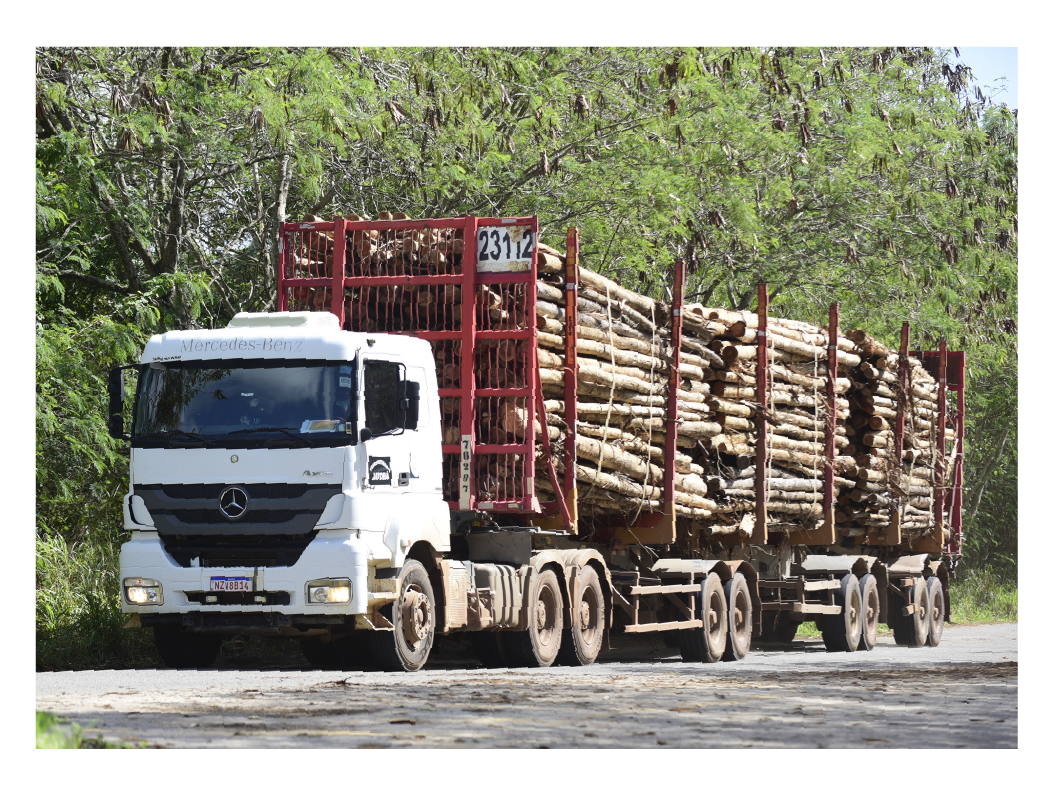
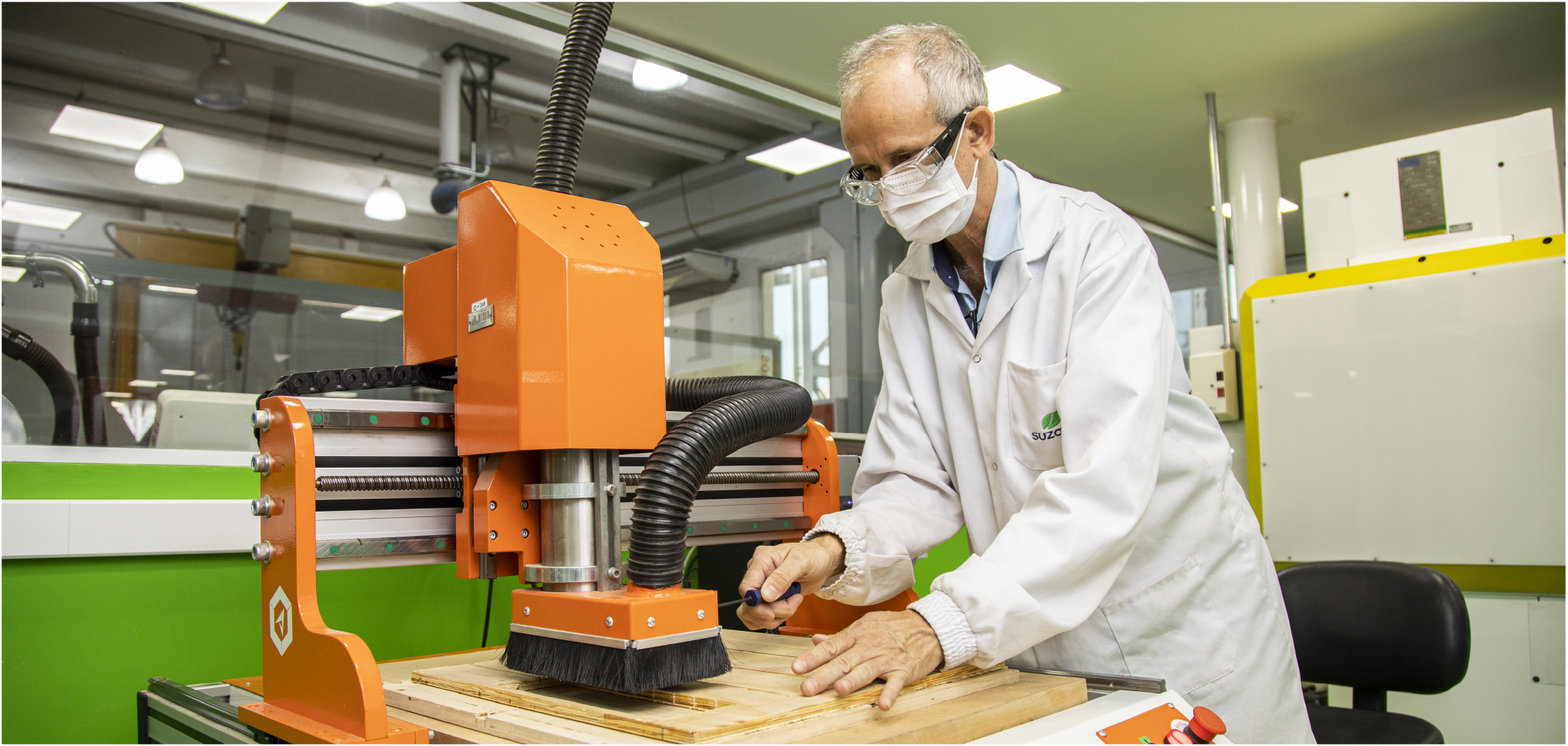
TRANSFORMATION
This front is intended to generate a competitive advantage for the business through different uses and applications for pulp, in line with the needs of our customers. Next, see the main projects in this area.
-
-
- Molecular marker
The development of a high-precision molecular marker gave Suzano the opportunity to make an early selection of young seedlings adjusted to the climate and soil characteristics of each type of region. With 80% accuracy, we can avoid physiological disturbances due to poor adaptation of the plant to the site, a phenomenon that often takes time to manifest, causing complications and losses in the field. - Specialty pulp portfolio
We started 2020 with huge demand to service our customers in China. This is because there have been changes in the Chinese legislation regarding the production of paper, forcing Suzano to develop a new pulp portfolio. To meet these demands, we offered two new pulp products to the market—one designed specifically for tissue, called EucaTissue, and the other, a high-quality unbleached pulp that satisfies the most demanding markets in terms of sustainability and can be used for the production of any type of paper, from the tissue to the packaging segment.
- Molecular marker
-
Both cases are in line with the practice of using fewer chemicals in the industrial process and delivering very high-quality pulp for paper production, including tissue. Both projects also required testing. But how do we carry out tests in the mills without being able to be there? The way to do this was to increase dialogue and intensify partnerships on the various fronts. The Pulp team formed a collaborative network between Suzano’s customers and professionals in the areas of Research and Development and Industrial Operation so that tests could be carried out by the customer in partnership with Suzano.
DIVERSIFICATION
What is the potential of eucalyptus and how can it be widely utilized? Bio-strategy projects are being developed to expand our portfolio of sustainable solutions in different niche markets. These are the main ones.
-
-
- Lignin
For lignin, 2020 was dedicated to reorganizing the strategy and overcoming problems with drying, which occurred at the Limeira (São Paulo state) plant in 2019. We started the process and began commissioning the plant, having already managed to produce lignin within the specifications desired by customers.
- Lignin
-
In addition to the priority market segments—elastomers and phenolic resins—we started to develop the second wave of lignin applications, contributing to the increased use of raw materials from renewable sources in other value chains. Learn more about Ecolig.
-
-
- MFC
GRI 102-10
The agreement with the Finnish company Spinnova, in which Suzano now has a 50% of the shares, continues to evolve year after year. In 2020, we entered into a global joint venture for the exclusive production and trading of textile fiber from microfibrillated cellulose (MFC), which represents a leap in production from 100 to 1,000 tons/year and will require an investment of approximately €22 million for the construction of a new plant in Finland in 2021 and 2022.
- MFC
-
The goal is to reinvent the textile industry using a fiber produced without any type of solvent and with the same amount of water already used in the process, saving from 54% to 100% of water and chemicals and giving us a sustainable product to compete with fossil-based fibers, such as polyester. In addition, CO2 emissions are up to 60% lower when compared to viscose and cotton. It is estimated that the new unit will enter into operation in 2022. It will be the first step toward having a large-scale plant with our partner in the future.
-
-
- Biocomposites
Biocomposites are also on the path of innovability, resulting from the mixture of eucalyptus pulp and fossil resins, such as polypropylene and polyethylene. Suzano holds the patent for this process, which has been improved in order to reduce the carbon footprint in the plastic chain, especially in durable goods (roof linings, external decks, vases, garbage bins, etc.). In the composition, we managed to replace up to 60% of the fossil component with pulp fiber. - Biopetroleum
Large oil companies showed interest in our product in 2020. In the last few months, we have been conducting tests with two major global oil companies in the U.S. and are approaching final approval for biopetroleum, which includes all the engineering and logistics solutions defined.
- Biocomposites
-
Final industrial tests involve the co-processing of biopetroleum, albeit in a reduced proportion, with oil. We are working side by side with the oil companies to raise this proportion to much higher levels. All this is developed in partnership with Ensyn, a company based in the U.S., in which Suzano has had a 25% ownership stake since 2012.
New applications for MFC
Microfibrillated cellulose, or MFC, is a super-refined cellulose that can be used in several different applications, with good prospects for scaling in the coming years. For this reason, in addition to advancing the production of textile fiber with Spinnova, Suzano has plans to produce MFC at its Limeira unit (São Paulo state) for internal and external application (to the market). Suzano has advanced in the application of MFC to replace fossil raw materials in cleaning products (detergents, softeners, liquid laundry detergents) and in the production of paints and fibre cement shingles (fibrous cement sheet), which were previously using asbestos, a proven carcinogen.
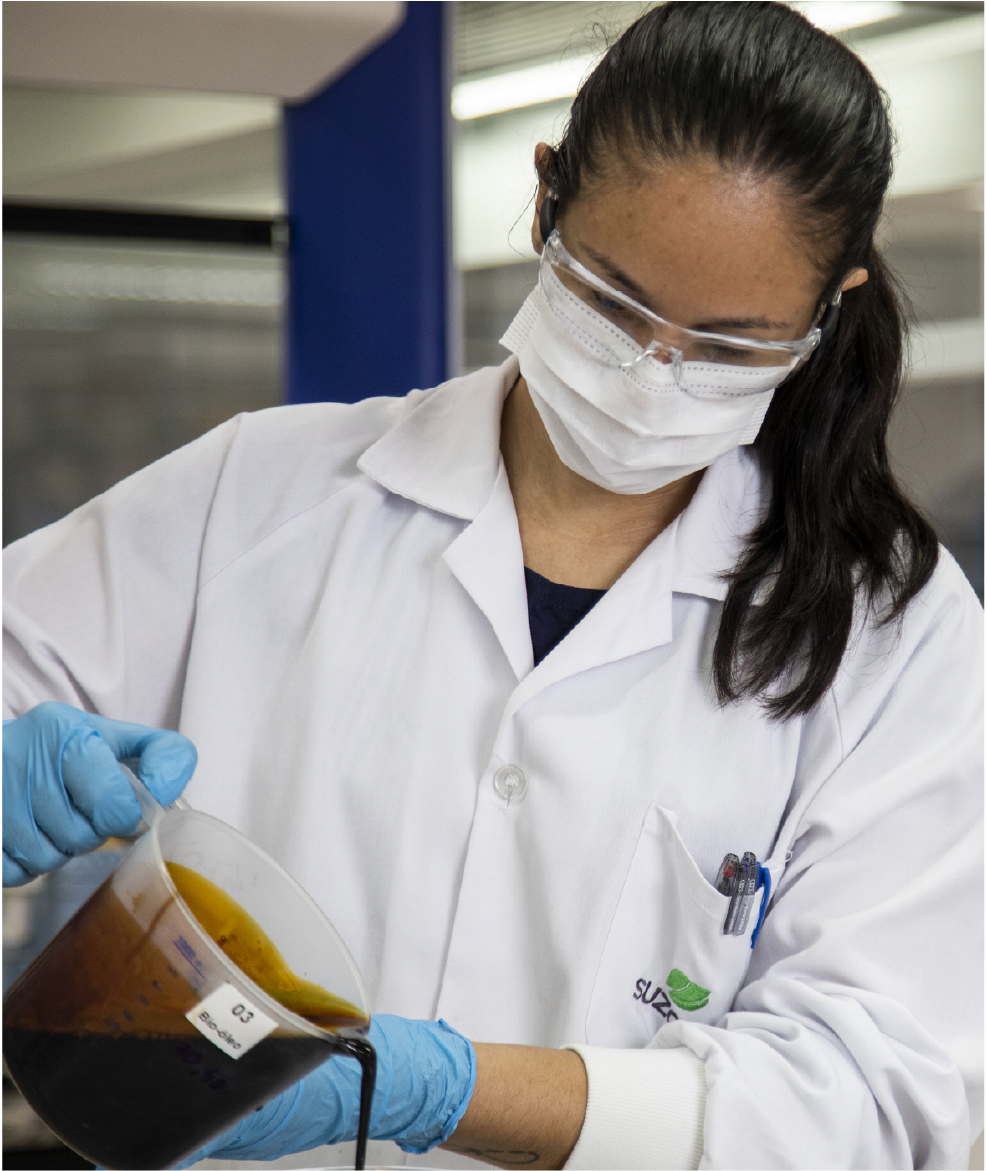
Replacement of plastic with paper
In the search for sustainable alternatives to replace the plastic used in the drinking straw, cup, and flexible packaging sector, Suzano has been developing innovative solutions based on improving the physical and mechanical properties of the base paper and the application of recyclable and biodegradable barriers on the surface of the paper. These barriers give the paper properties to resist water, fat, water vapor, and oxygen, and are also heat-sealable (heat-sealing machines). These are important characteristics, for example, for food packaging such as for cookies and non-perishable foods. This substitution represents a major technical and economic challenge. In 2020, laboratory and industrial tests were conducted in order to approve the technology in different players in the market. Significant advances have been made, not only in validating the performance and machinability of the products—that is, whether or not they perform well on filling machines—but also in complying with the strict standards established by regulatory agencies.
We hope to continue advancing with the tests in order to offer a high quality product that meets the technical requirements and offers a competitive price to the market, allowing us to migrate to alternatives coming from renewable sources and become more sustainable.
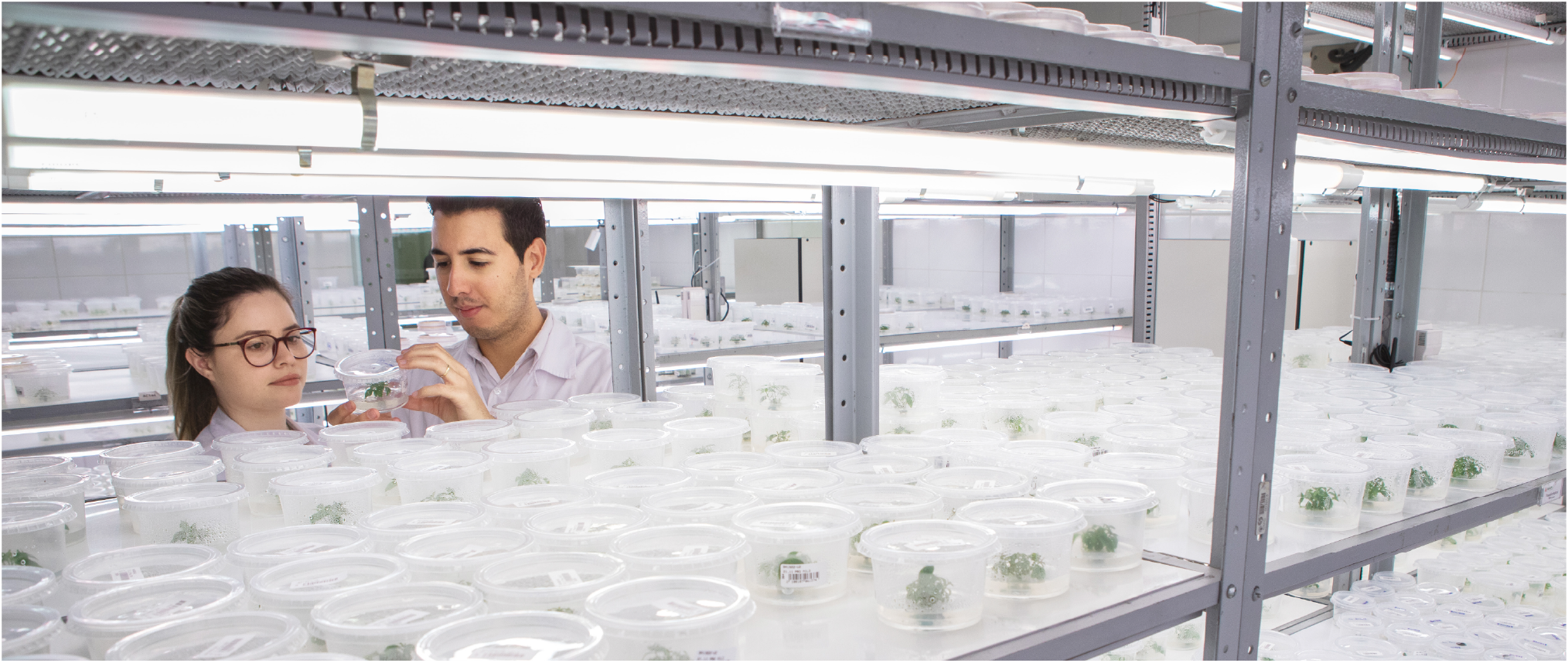
FuturaGene
FuturaGene, Suzano’s subsidiary and a leader in forestry biotechnology, produced significant advances in its projects in 2020. Despite the limitations imposed by the pandemic, we adapted to the new reality and managed to maintain activities in laboratories, greenhouses, and fields, whilst implementing stringent all protocols for sanitation and distancing between researchers, allowing important projects to follow their normal course.
It is worth highlighting the progression of studies for the completion of the regulatory package aimed at submitting the application for commercial use of herbicide-tolerant eucalyptus. The submission of the regulatory dossier for this technology to the Brazilian Technical Commission for Biosafety (CTNBio) is planned for 2021. In addition, we advanced with our biosafety studies of insect-resistant eucalyptus, which will continue in 2021 and will be part of the regulatory package for this technolog.
In addition to these advances in the crop protection platform, our platform to increase forest productivity continues to evolve. On this front, we expanded field tests with derivatives of our genetically modified eucalyptus approved by CTNBio in 2015. Experiments with this technology, planted in the different regions where Suzano operates, have shown promising results after more than three years in the field, when compared to the best conventional clones.
Other technologies in FuturaGene’s pipeline have also made significant progress, including those focused on wood quality, in addition to advances in the areas of Bioinformatics and Genomics.
Teams from Suzano and FuturaGene maintained an open dialogue with several stakeholders to share information about the safety and potential benefits of biotechnology in trees, elucidating how these tools may contribute to achieving global sustainability. Learn more on the website.
Suzano and its subsidiaries currently perform activities with genetically modified organisms (GMOs) only for research purposes and in areas outside the scope of certification. Learn more about this topic by visiting our Indicators Center.
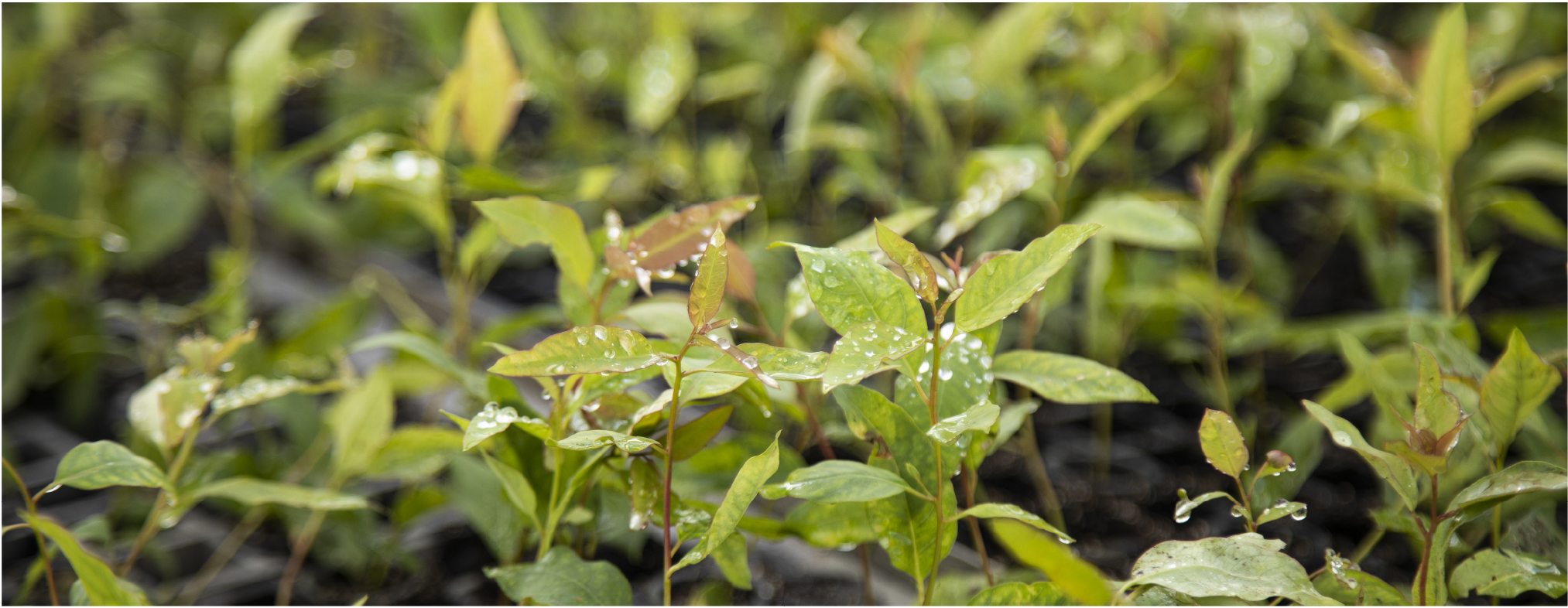
DIGITAL TRANSFORMATION
AN INCREASINGLY MORE DIGITAL SUZANO
GRI 103-1, 103-2, 103-3
Digital transformation has become an important movement at Suzano. In 2020 alone, more than 30 projects developed for this purpose impacted more than 4,000 employees and produced cash generation of approximately R$50 million for the company (see some of the highlights on page 55). In addition, digital training initiatives in 2020 qualified 37 data scientists from different areas of the business.
Since this movement aims to disseminate digital skills throughout the company, several forums were created to enable collaborative decisions. As an example, we cite the governance process, which involves several Functional Directors who convene quarterly to discuss the digital future of the company and a panel formed by representatives from different areas of the business to define the priorities for the year.
This new work format is less bureaucratic and hierarchical. The work becomes collaborative, deliveries are made in less time, there are gains in productivity, and the results appear much faster. Digital initiatives take place on four work fronts, which are analyzed from a strategic and governance perspective. These include:
- Digital Center
The Digital Center evaluates the strategic projects for the evolution of the company. It then internally organizes processes that associate IT, digital transformation, and business areas to implement these digital technology solutions, such as machine learning and optimization, which stem from artificial intelligence using agile methodology and design thinking techniques associated with digital technology. - Open Innovation
In order to make innovation accessible, the Open Innovation front operates on a collaborative solution model, in which Suzano’s process improvements, suggested by any employee, are presented as a business case to partners of the company’s innovation ecosystem in Brazil (Endeavor, Plug and Play, and Agtech) and in countries such as China, Germany, Israel, and the U.S. With curatorship by these partner companies, seven to ten startups are invited to present their solutions to the problem. Suzano chooses the proposal to be tested, with the prospect of the startup becoming a partner if the solution works. We are currently developing ten projects with startups. One of them, called Sara, tests artificial intelligence in the Procurement area (see more on page 64). - Design Thinking
User-centered and focused on expanding the mindset and providing more solution tools, this front uses design-thinking methodologies so the organization can work as a collaborative creation environment, co-creating and prototyping in order to find solutions faster. - Agility
Collaborative work format in which multidisciplinary groups, called squads, through various methodologies and analysis of indicators, can deliver solutions every 15 days.
Digital Academy
Decentralizing knowledge requires trained professionals in all company areas. The purpose of the Digital Academy is to train data scientists in the company for the various business segments. In addition to the desire to learn data science, participants develop a case and utilize project-based learning, which is associated with one of Suzano’s Long-Term Goals.
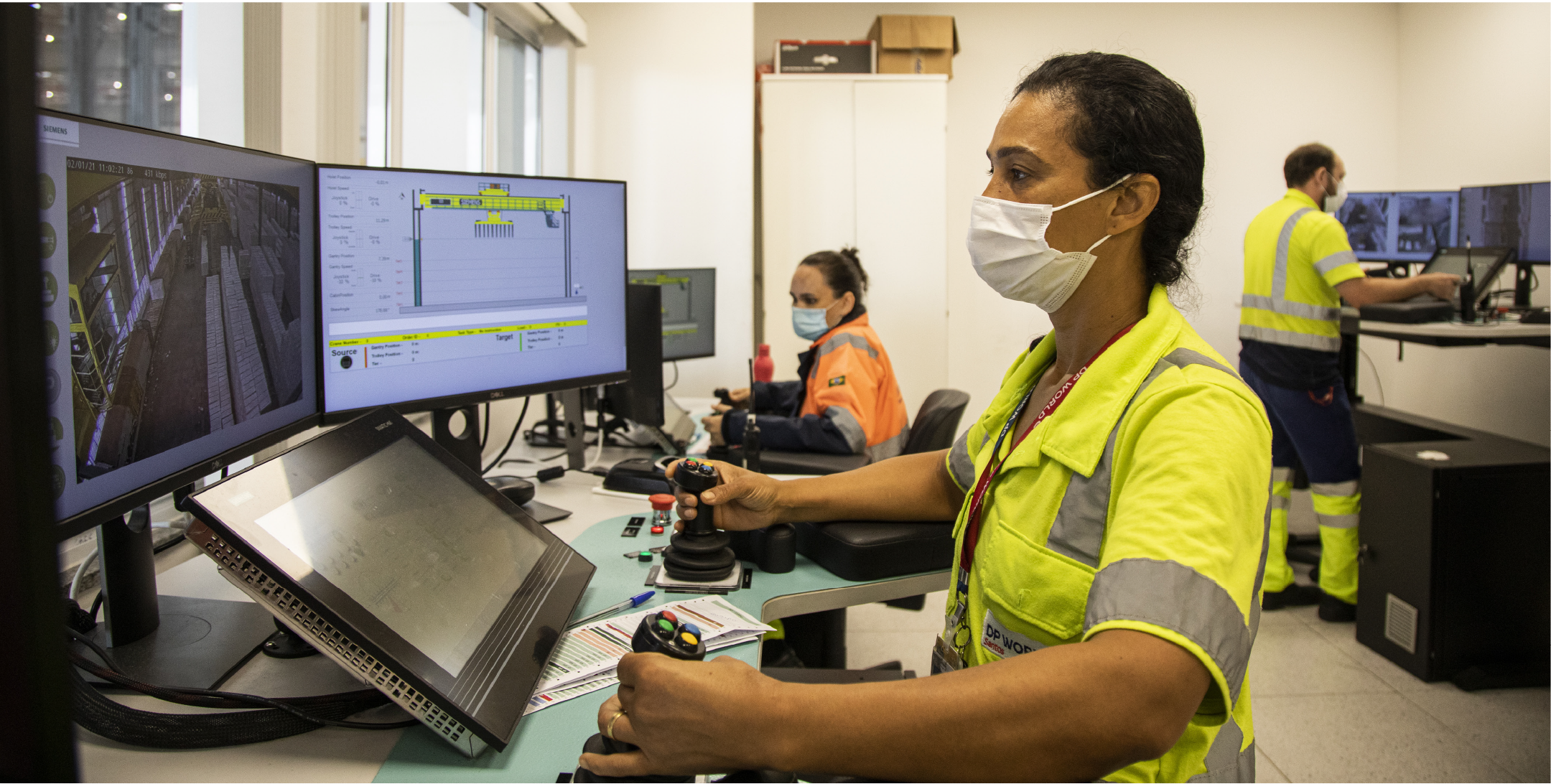
LOGISTICS
FLEXIBILITY AND AGILITY IN OPERATION
Suzano’s logistics model, which today has 11 mills in four Brazilian regions and operates in three different ports in the country, gave the company flexibility to deal with the impacts of COVID-19, which peaked in March, April, and May 2020, months characterized by high consumption of tissue in the countries of the Northern Hemisphere and Asia, where the company’s largest customers are concentrated.
Our strategy to avoid a shortage in pulp supply to our customers was to lower the stock in Brazil, transferring about 300,000 tons of pulp to supply centers abroad. We replicated the same model in the domestic market, and we managed to minimize logistics risks related to problems or disruptions in the road, rail, and maritime systems resulting from the pandemic.
At high pressure
Other challenges that have nothing to do with the health crisis were also faced by the Logistics team in 2020, making the period even more complex. An interruption on a stretch of the railway in Três Lagoas (Mato Grosso do Sul state) blocked the operation on this route for six months, which led Suzano to transfer the transport of 450,000 tons of pulp to trucks and to another railway in activity in the region, a move that required enormous efforts from all teams involved.
The increase in the transportation cost of pulp by ship, due to fuel-switching, was also challenging for Suzano. The ships started to operate on low sulfur fuel oil, which led to an increase in cost of approximately US$100 per ton.
At the Port of Itaqui, located in the city of São Luís (Maranhão state), the construction works for a mooring berth—whose purpose is to facilitate the logistics flow in that terminal, which is under great pressure due to the increase in the volume of competition—started in October 2020. This was six months after the initial schedule due to the difficulty in mobilizing people and equipment at the beginning of the pandemic. At the Port of Santos (São Paulo state), the challenge was to learn and adapt with the start of the Vertere Project. In April 2020, four months ahead of schedule, Suzano’s loading in Santos began to take place in a private terminal owned by a partner company, in which Suzano made investments. The new structure has a 35,000 sqm warehouse with a capacity for more than 150,000 tons of pulp. The facilities also include an overpass, the extension of the terminal’s pier section, and a railway branch that integrates with warehouse operations. Cargo is handled by overhead cranes, controlled remotely by the operators. The launch of Vertere also provided environmental benefits by reusing water and energy, which are expected to be accounted for throughout 2021.